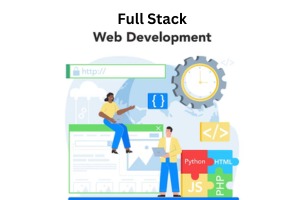Course Overview
Full Stack Web Development Online Training in Hyderabad, Bangalore, India
Full Stack Web Development refers to the practice of developing both the front-end and back-end components of a web application. A full stack web developer is proficient in multiple technologies and frameworks that allow them to work on different layers of the application.
The components of a full stack web development include:
-
Front-end Development: This involves creating the user interface and user experience of the web application that users interact with directly. Front-end developers typically use HTML, CSS, and JavaScript along with various libraries and frameworks like React, Angular, or Vue.js to build responsive and interactive user interfaces.
-
Back-end Development: The back-end is the server-side of the web application responsible for processing user requests, managing databases, and handling business logic. Full stack developers often use server-side technologies like Node.js, Python (with frameworks like Django or Flask), Ruby (with Ruby on Rails), Java (with Spring or other frameworks), or PHP to build the back-end.
-
Database Management: Full stack developers must be familiar with database technologies to store, retrieve, and manage data efficiently. Commonly used databases include MySQL, PostgreSQL, MongoDB, and SQLite.
-
APIs (Application Programming Interfaces): APIs are used to establish communication between the front-end and back-end of the web application. Full stack developers need to understand how to design and consume APIs to ensure smooth data exchange between different parts of the application.
-
Version Control Systems: Using version control systems like Git is crucial for collaborative development and code management, allowing developers to track changes, merge code, and revert changes when needed.
-
Deployment and Hosting: Understanding how to deploy web applications to servers or cloud platforms and managing the hosting environment is an essential skill for full stack web developers. Common hosting options include platforms like Amazon Web Services (AWS), Microsoft Azure, and Heroku.
-
Security: Full stack developers must be aware of web security practices and potential vulnerabilities to ensure the application's protection against common attacks, such as Cross-Site Scripting (XSS) or SQL injection.
-
Testing and Debugging: Knowing how to perform various types of testing (unit testing, integration testing, etc.) and debugging techniques is vital for delivering a stable and robust web application.
Full stack web development requires continuous learning and staying up-to-date with the latest technologies and best practices since the web development landscape evolves rapidly. Many developers find full stack development appealing as it allows them to work on both the user-facing aspects and the underlying technical infrastructure, providing a broader understanding of the entire web application development process.
What is full-stack web development?
Reviews
Add Your Review
Reviews
Full Stack Web Development Rated
5.0 based on 1 reviews.
By: Ramya, Rating:
BESTWAY TECHNOLOGIES is a great place to acquire knowledge in Web Development. I am happy about my decision to join Bestway technologies to build my career in Full Stack Web Development. It has a Good Training culture and Internship which helps freshers obtain as much as Full Stack Web Development Knowledge during the training period.
